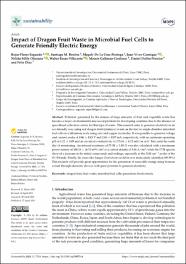Mostrar el registro sencillo del ítem
Impact of Dragon Fruit Waste in Microbial Fuel Cells to Generate Friendly Electric Energy
| dc.contributor.author | Rojas-Flores, Segundo | |
| dc.contributor.author | Santiago, M. Benites | |
| dc.contributor.author | De La Cruz-Noriega, Magaly | |
| dc.contributor.author | Vives-Garnique, Juan | |
| dc.contributor.author | Milly Otiniano, Nélida | |
| dc.contributor.author | Rojas-Villacorta, Walter | |
| dc.contributor.author | Gallozzo-Cardenas, Moisés | |
| dc.contributor.author | Delfín-Narciso, Daniel | |
| dc.contributor.author | Díaz, Félix | |
| dc.date.accessioned | 2023-09-22T19:42:25Z | |
| dc.date.available | 2023-09-22T19:42:25Z | |
| dc.date.issued | 2023-03-27 | |
| dc.identifier.uri | https://hdl.handle.net/20.500.13053/9449 | |
| dc.description.abstract | Pollution generated by the misuse of large amounts of fruit and vegetable waste has become a major environmental and social problem for developing countries due to the absence of specialized collection centers for this type of waste. This research aims to generate electricity in an eco-friendly way using red dragon fruit (pitahaya) waste as the fuel in single-chamber microbial fuel cells on a laboratory scale using zinc and copper electrodes. It was possible to generate voltage and current peaks of 0.46 ± 0.03 V and 2.86 ± 0.07 mA, respectively, with an optimum operating pH of 4.22 ± 0.09 and an electrical conductivity of 175.86 ± 4.72 mS/cm at 8 °Brix until the tenth day of monitoring. An internal resistance of 75.58 ± 5.89 Ω was also calculated with a maximum power density of 304.33 ± 16.51 mW/cm2 at a current density of 5.06 A/cm2, while the FTIR spectra showed a decrease in the initial compounds and endings, especially at the 3331 cm−1 peaks of the O–H bonds. Finally, the yeast-like fungus Geotrichum candidum was molecularly identified (99.59%). This research will provide great opportunities for the generation of renewable energy using biomass as fuel through electronic devices with great potential to generate electricity. | es_PE |
| dc.format | application/pdf | es_PE |
| dc.language.iso | eng | es_PE |
| dc.publisher | MDPI | es_PE |
| dc.rights | info:eu-repo/semantics/openAccess | es_PE |
| dc.rights.uri | https://creativecommons.org/licenses/by/4.0/ | es_PE |
| dc.subject | dragon fruit; fruit waste; microbial fuel cells; generation; bioelectricity | es_PE |
| dc.title | Impact of Dragon Fruit Waste in Microbial Fuel Cells to Generate Friendly Electric Energy | es_PE |
| dc.type | info:eu-repo/semantics/article | es_PE |
| dc.identifier.doi | https://doi.org/10.3390/su15097316 | |
| dc.type.version | info:eu-repo/semantics/publishedVersion | es_PE |
| dc.publisher.country | GBR | es_PE |
| dc.subject.ocde | 3.03.00 -- Ciencias de la salud | es_PE |
Ficheros en el ítem
Este ítem aparece en la(s) siguiente(s) colección(es)
-
Web of Science (WOS) [236]


